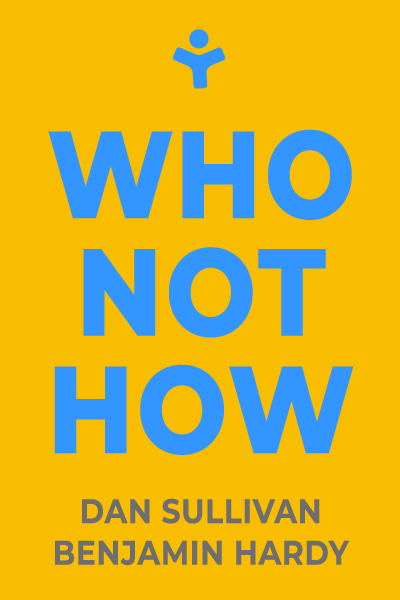
Who Not How: The Formula to Achieve Bigger Goals Through Accelerating Teamwork
by Dan SullivanWho Not How emphasizes the importance of having a team of people to help you achieve your goals rather than trying to do it all yourself. It also encourages readers to recognize that their potential is not fixed but can be expanded through collaboration. By investing in the right people and resources, readers can exceed their own limitations and achieve their goals.
Making Money with the Least Effort
One of the most effective strategies for making money is shifting your mindset from asking "how" to asking "who." This approach allows you to achieve your goals with less effort and greater efficiency. Let's explore this concept through the story of Richie, a 16-year-old boy who wanted to start earning money.
Initially, Richie considered the conventional route of getting a job at a local grocery store or gas station. However, his father offered him a different perspective. Instead of working for someone else, his father suggested that he buy irregularly sized and shaped watermelons from a farm and sell them in their neighborhood.
Because of his father's input, Richie didn't have to invest months of his time and sacrifice his freedom. Instead, he achieved the desired result almost immediately. This highlights the power of having a "who" in your corner. When you seek assistance from someone with expertise or resources, you gain access to their knowledge, insights, and capabilities that are beyond your current reach. While the "how" approach is linear and slow, the "who" approach is non-linear, instantaneous, and exponential in its impact.
In the world of business, finding specific individuals to support you in achieving your goals often requires an investment. However, as demonstrated in Richie's story, not all "whos" require money. Richie didn't have to spend a dime to ask his father for advice, yet it saved him three months and changed his life forever! In essence, the concept of "Who, Not How" revolves around making the most out of our relationships and being transformed by them.
Actions to take
Communicating Your Vision to the Right People
Before you can find the right people to help you achieve a specific goal, you need to learn how to communicate your vision first. When you are able to express your vision clearly, you will naturally attract the appropriate individuals who share your goals.
A highly valuable technique for conveying your vision is the "Impact Filter." This tool condenses various aspects of your goal into a concise one-page document. It encompasses the purpose, significance, desired outcome, best and worst possible results, and criteria for measuring success.
By addressing the questions presented in the Impact Filter, you equip yourself with the necessary tools to articulate and elucidate your objectives to others. The ability to express your goals and their significance clearly is a fundamental skill that greatly contributes to achieving success. Only when your goals are precisely defined and effectively communicated can you begin to gather the support required to accomplish them.
Actions to take
Building a Valuable Network
Joe Polish, the founder of the high-level marketing mastermind groups, Genius Network and GeniusX, believes that with the right “genius network,” any problem in the world can be solved.
A helpful analogy in understanding relationships is to compare them to clothing. Much like wearing ill-fitting garments would be impractical and uncomfortable, engaging in relationships that lack a genuine sense of connection and compatibility is unlikely to result in fulfillment or success. Rather than perceiving relationships as burdensome tasks or obligations, it is far more advantageous to nurture authentic connections.
On top of establishing connections with the people we resonate with, it's also essential to continuously provide value for them. Instead of approaching relationships from a self-centered perspective, constantly asking ourselves, "What's in it for me?" it is far more beneficial to adopt a mindset focused on serving and adding value to others. By shifting our perspective to "What's in it for them?" we acknowledge the importance of meeting the needs and desires of those within our network. This mindset shift enables the cultivation of stronger, more fulfilling relationships based on mutual support, collaboration, and shared growth.
Actions to take
Fostering a Collaborative Culture
The traditional education system has long fostered a competitive environment where individuals' self-worth is tied to their performance on tests or assignments relative to their peers. Similarly, many business cultures have embraced individualism and competition, prioritizing personal success over collaboration. However, research conducted by Dr. David Logan highlights the drawbacks of such cultures, revealing that most businesses operate within what he refers to as "Stage 3 Culture."
A Stage 3 Culture is characterized by internal competition, where each person strives to outperform others for personal gain. This mindset often leads to limited collaboration and a lack of cohesive teamwork. In contrast, "Stage 4 Cultures" prioritize teamwork and collaboration, and they tend to be more productive and successful in both business and sports.
To illustrate the importance of collaboration, we can look at the example of Kobe Bryant and Shaquille O'Neal, two basketball superstars who played together for the Los Angeles Lakers. When they joined forces, they were an unstoppable duo, winning three championships in a row. However, their intense competition with each other eventually drove Shaq to leave the team. Just imagine what could have been if they had managed to maintain their partnership! They likely would have secured even more championships together.
Nowadays, with technology, information, and globalization rapidly advancing, people are starting to realize that the old ways of doing things no longer cut them. We're moving away from this limited "How" model. People are increasingly seeking work that is collaborative, flexible, and meaningful. Moreover, the ability to create connections with mentors, teachers, and partners has become crucial for those aiming to unlock incredible wealth and freedom in their endeavors.
Actions to take
Don’t just read. Act.


